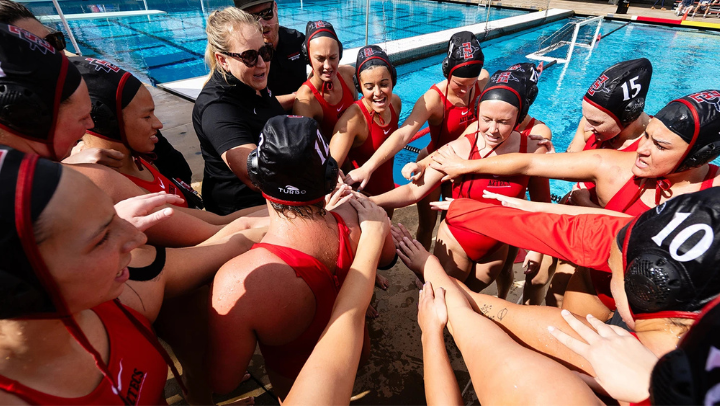SDSU Has Received Federal Designation as an AANAPISI-Eligible Institution
The identification acknowledges the university's commitment to serve students who identify as Asian American, Southeast Asian American, Desi American, Native Hawaiian or Pacific Islander.

Since March 2021, the U.S. Department of Education has recognized San Diego State University as an Asian American Native American Pacific Islander-Serving Institution (AANAPISI).
Introduced in Congress in 2002, the AANAPISI designation became law in 2007; currently, more than 280 institutions are recognized — among those, 14 CSU campuses are recognized. To qualify, institutions must meet two main criteria: (1) Asian American or Native American Pacific Islander undergraduates must comprise at least 10% of undergraduate student enrollment, and (2) At least 50% of the student body must also receive federal need-based financial assistance, such as Pell Grants and federal work-study.
This designation is an important outcome of SDSU’s strategic plan. Under the five-year plan, the charge of Activity 37 has been to develop a plan to secure AANAPISI status for the university.
“We are already a transnational public university, now with four campuses in border regions around the world,” said SDSU President Adela de la Torre.
“It is our strategic priority to ensure that all of our students feel welcome, no matter who they are, which campus they study at, or where they call home,” de la Torre said. “To be a national leader and model for inclusive excellence requires that we have clear plans and metrics in place which support this. That’s the role our strategic plan has played for us.”
“Receiving the AANAPISI designation, one of the aspirational planning goals which is now a reality, is a strong reflection on our faculty and staff and the care they provide for our students, especially our Asian Pacific Islander Desi American (APIDA) students,” de la Torre said. “Every member of our campus community should be proud of this designation, and of the continuing progress we are making to achieve equity and true participation in everything we do.”
Committed to Serving the APIDA Community
Recognition as an AANAPISI allows the university to apply for funding and resources that will directly support APIDA students.
J. Luke Wood, vice president for student affairs and campus diversity, said: “This academic year has been a special year for the SDSU APIDA community.”
SDSU established the Asian Pacific Islander Desi American (APIDA) Resource Center in July 2020.
“The SDSU APIDA Center provides APIDA-identified students with a sense of community, belonging, and home,” said SDSU student Giannela Gonzales. “Through a variety of events such as cultural education workshops, heritage celebrations, socials, and other programs, we are able to learn more about our own histories and amplify those in our community.”
In its first year, the APIDA Center provided more than 300 programs and stewarded initiatives such as the University Senate Resolution in Response to the Escalating Anti-Asian Hate in the United States and the SDSU APIDA Pledge. In addition, the university has introduced expanded student support services and enhanced academic enrichment activities for members of the APIDA community.
“The core of our mission as a public institution is to understand our varying experiences and to both find and implement ways for us to have meaningful connections and meaningful personal growth,” Wood said. “This is especially important for members of our community, including our APIDA community, who have experienced some of the most painful incidents in the last year. Such communities need us the most, and I am personally proud that our community is so invested in improving the quality of education and the quality of experience for our students.”
To further solidify SDSU’s commitment to the APIDA community, the APIDA Center has secured a location in the Conrad Prebys Aztec Student Union. A grand opening ceremony is being scheduled, and details will be shared at a later time.
Part of a Larger Network
Virginia Loh-Hagan led the efforts to secure SDSU’s federal eligibility as an AANAPISI, one held by other institutions such as the University of California, Irvine, University of Guam and South Seattle College.
“I am very proud of our intentionality in serving APIDA students at SDSU,” said Loh-Hagan, director of the APIDA Center.
Loh-Hagan helped prepare the grant proposal to receive funds from the U.S. Department of Education and from APIA Scholars to support Pacific Islanders. Both of these highly competitive grants are only available to AANAPISI-eligible institutions.
“Whether or not we get the grants is not as significant as our applying for them,” Loh-Hagan said “This is the first time SDSU has pursued APIDA initiatives in this way. This is a huge step forward in achieving equity.”
Being an AANAPISI means a great deal to the SDSU APIDA community, according to Loh-Hagen, and brings APIDA issues and needs to the forefront. “When we create systems and structures that improve the lives of our communities of color, then we improve the lives of everyone,” she said.
In addition to being able to apply for specific grants, being federally recognized as an AANAPISI also connects the SDSU university community to a larger AANAPISI network.
Loh-Hagan, who has formed APIDA collectives in the San Diego region and across the California State University system, said: “We are thrilled to be able to work with colleagues across the state and nation who share our goal of increasing the voice and visibility of the APIDA community.”



